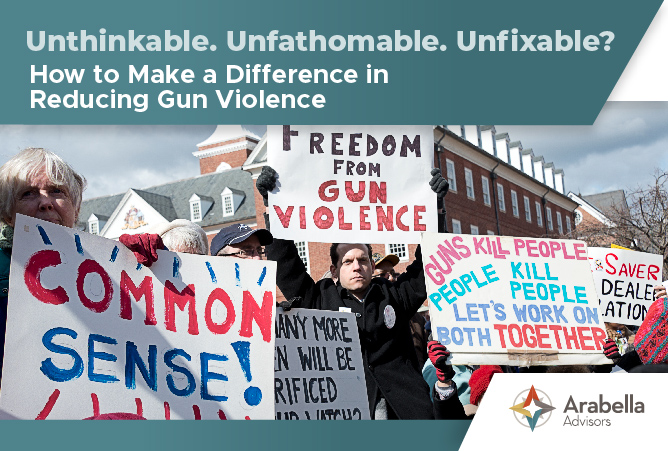Unthinkable. Unfathomable. Unfixable?

How do we make sense of events that deeply challenge all we think we know about our morality, our humanity, and our faith? How can we restore trust in the basic institutions of government charged with ensuring our public safety? How can we feel safe where we buy our food, where we worship with neighbors and friends, and where we entrust our children to learn and play?
What can we do to make a difference in the wake of horrifying, yet common, tragedies like the ones that keep unfolding in cities and towns across the United States?
First, we need to understand that while mass shootings bring fresh awareness to and outrage about gun violence in America, they do not represent the majority of gun deaths in the country.
The truth about gun violence is that most deaths attributed to guns are due to suicide or interpersonal community violence, including domestic violence. The downlow: where a gun is present in a household, the risk of suicide and homicide to all members of the household increases.
Second, we must realize that gun violence disproportionately impacts communities of color, especially Black and brown communities. Racial hatred amplified by social media, lack of trust in law enforcement, low-performing and under-resourced schools, and weak social safety nets make these communities especially vulnerable to the daily scourge of guns.
Third, we should take a public health approach to reducing gun violence by focusing on prevention. There are numerous effective, evidence-based interventions that we can support, scale, and embed in our civic and social institutions. Some of these interventions directly address gun safety, while others also address the environment we—especially our young people—are raised in, which makes violence appear to be a viable option to deal with trauma, mental health crises, and abuse.
Last year, we hosted a webinar with experts and advocates who shares their insights and laid out actions you can take as funders, philanthropists, and citizens. You can watch the recorded webinar here.
Today, as an emergency response, we offer the following suggested organizations working on the front lines of this issue, which you can support immediately. All can be reached online, but we invite you to be in touch with us if you have any questions.
We also invite you to think about other actions you can take immediately, including the following:
- Talk to family, friends, neighbors, and colleagues about what you can do to be more alert to threats. Individuals at risk of committing gun violence often present signs of distress that signal their intentions. To identify these signs early enough to intervene, everyone in the individual’s life needs to be alert to them and communicate with others about how to act.
- Get informed about the resources available in your community to address gun violence in all its forms. While statewide and national politics may seem intractable, local action via city councils, school boards, county public health agencies, community violence prevention organizations, and the like are powerful avenues for change when constituents are engaged.
- Use your voice to have difficult conversations with those with whom you disagree on gun safety issues. Dialogue can make a difference.
This post was originally developed by our friend and colleague, Gwen Walden. It has been updated by Erin Spence, with appreciation for Gwen’s many years of leadership on this topic.
